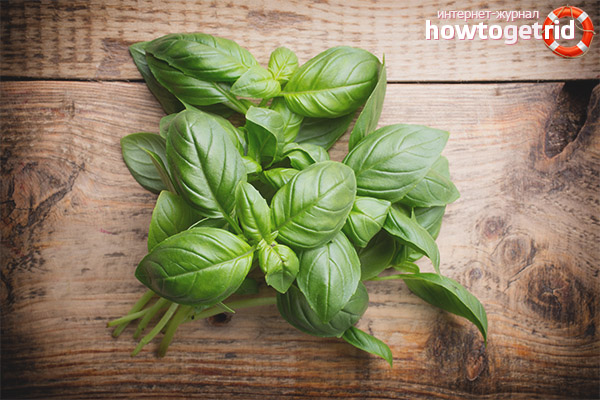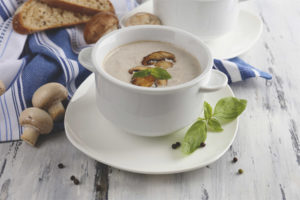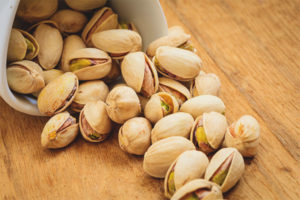The content of the article
Healthy nutrition during pregnancy is the key to its proper course, safe delivery and the health of the unborn baby. It is the quantity and quality of food that determines the development of the fetus at each stage of its growth. Some products can cause obvious harm to the health of both women and the baby. With regard to a number of products, expectant mothers have many questions: can they be used during the period of gestation and in what quantity.
Basil Basics
Many gourmets do not imagine exquisite dishes without the presence of fragrant green basil. People got acquainted with the healing and taste properties of this plant in ancient times. In ancient Egypt and India, it was known as a sacred plant, in ancient Greece it was used for treatment, and in ancient Rome was eaten. This annual thermophilic plant has a spicy balsamic smell, reminiscent of both cloves, allspice and nutmeg. Basil is one of the oldest spices. It is added to salads, pastes, soups. Tea is made from leaves. This greens goes well with meat, vegetables, dairy products. It is widely used for preservation.
The following varieties of basil are used in food:
- fragrant, it is camphoric or ordinary;
- purple;
- green;
- cinnamon;
- citric;
- the black;
- red.
Basil composition
The plant contains 1–1.5% of essential oils, found mainly in inflorescences. The composition of these oils is determined by the place of growth. Also in the greenery there are tannins and minerals, glycosides, organic acids, sugars, fiber, volatile, vitamins. The aroma of essential oil is due to the presence of eugenol, methylchavicol, linalool, camphor and other fragrant substances.
Useful properties of basil
Basil is not just a fragrant spice, but also a healthy dietary product. It contains many vitamins and minerals, has healing properties, but not all of them will benefit during pregnancy.
The main advantages of the basil:
- The leaves of the plant contain a large amount of provitamin A. It is involved in the elimination of free radicals that are harmful to the female body. Beta-carotene protects against the formation of malignant tumors, slows down aging.
- Basil prevents the formation of atherosclerotic plaques, strengthens blood vessels, improves their elasticity. Due to this, the risk of developing heart diseases decreases, the activity of the heart muscle normalizes.
- Antioxidants are present in the plant's essential oils, they help fight bacterial infections. The optimal combination of linolenic and oleic acids helps to resist Pseudomonas aeruginosa, staphylococcal and other infections. An extract from basil leaves is part of the preparations for the treatment of herpes and other viral diseases.
- The use of basil has a beneficial effect on the functioning of the gastrointestinal tract. Herbal infusions with basil relieve inflammatory processes in the intestines, reduce stomach cramps, and support a healthy intestinal microflora. Basil extract reduces symptoms of heartburn, which is familiar to almost every pregnant woman. The growing uterus presses on the digestive organs, causing the stomach to be refluxed into the esophagus. For the same reason, many women suffer from increased gas formation. The problem of flatulence can be solved by using basil leaves or its decoctions.
- Basil essential oil is present in painkillers and antiseptics.They have an anti-inflammatory effect. These funds can be used to reduce joint pain, to relieve swelling of the lower extremities. Swelling of the legs in the second half of pregnancy is a serious symptom that cannot be ignored.
- Many drugs for a pregnant woman are banned. Tea with basil due to its high content of vitamin C is a good prevention against colds. It will help reduce the temperature, relieve cough, cure sore throat. The leaves of the plant can be added to the mixture for inhalation.
- Basil improves blood circulation well, contributing to a more productive work of the brain, facilitating the process of memorization.
- Most pregnant women have an increased level of anxiety. In the first trimester of pregnancy, this is due to hormonal changes in the body and manifestations of toxicosis. The closer the term of birth, the more the woman is worried about their outcome, the health of the unborn child. Pregnant women are disturbed by sleep; they have difficulty falling asleep. Basil leaves have a beneficial effect on the nervous system. 10-12 fresh leaves per day are enough for the nervous system to stabilize and the woman's mood to improve. The expectant mother will be able to fall asleep easier, her sleep will be deep and healthy.
- Basil leaves can be used to care for the oral cavity. Dried powdered leaves are used instead of toothpaste. This tool will strengthen tooth enamel, eliminate bad breath, and relieve gum inflammation.
- Several leaves of the plant will have a choleretic effect. For women with gallstone disease, this is a great alternative to medications. Also, with the help of basil juice mixed with honey, it is possible to facilitate the grinding and removal of kidney stones.
- Basil relaxes muscles, relieves spasms. To reduce headaches, you can drink tea with basil, attach fresh leaves to the temples.
- The antimicrobial properties of the plant are used in the fight against yeast and fungal infections.
- Basil can heal otitis media. Basil oil, heated to a comfortable temperature, when instilled into the ear reduces pain, relieves inflammation.
Hazardous qualities of basil
During pregnancy, a woman should be careful when using basil. Due to its high tonic properties, an excess of basil can provoke uterine hypertonicity. And this is a direct path to miscarriage in the early stages or premature birth in the last trimester of pregnancy. Therefore, it is necessary to limit the use of this green. Also, the use of basil is contraindicated in women who have high blood pressure. This product should be used with caution in the presence of diabetes mellitus, thrombophlebitis, and heart diseases.
If you feel great, you can limit the use of basil to two or three times a week in small portions. If you experience any problems, consult your gynecologist. Given the existing acute or chronic diseases, the characteristics of the course of pregnancy, the doctor will select for you the necessary dose of this greenery. In the absence of contraindications, you can add leaves to the salad and other dishes to enrich them with vitamins and minerals. Include greens in your diet in small quantities; use caution.
Video: the benefits of basil for the body










Submit